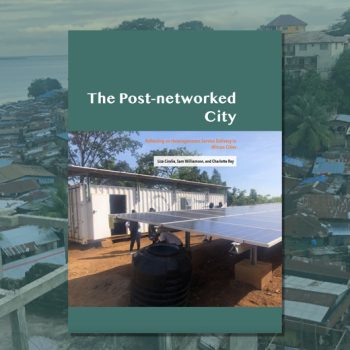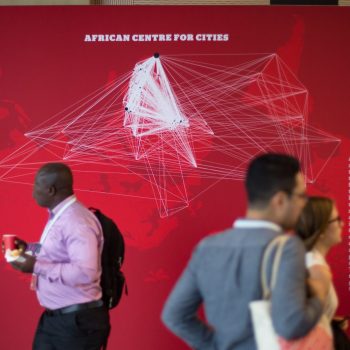About ACC
The nature and functioning of cities are at the epicentre of larger questions dominating the 21st Century about how we will fashion new economic and political systems that can effect a radically inclusive and sustainable society. Given that 95% of urban growth between now and 2050 will take place in Africa and Asia, the global South must take the lead in exploring and theorising emergent forms of urbanity. By necessity this knowledge practice must be rooted in concrete experiments to figure out how to imagine, enact and institutionalise novel forms of city-making.
The African Centre for Cities is one of the leading African knowledge centres working on this project in conjunction with critical friends across the world.
ACC is an interdisciplinary hub at the University of Cape Town with a mandate to conduct meaningful research on how to understand, recast and address pressing urban crises. Since most urban challenges—for example, food security, climate change adaptation, economic inclusion, cultural vitality and tolerance—are inherently interdisciplinary and spatially layered, ACC nurtures the co-production of knowledge between academia and other social sectors. Furthermore, research gets designed with multiple publics in mind and a concern with continuously enriching curriculum and postgraduate development.
Mission and strategic objectives
ACC is engaged in collaborative research and developing imaginative policy discourses and practices to promote vibrant, just and sustainable cities.
This purpose has become all the more pertinent with the adoption of Agenda 2063 at a pan-African level, which chimes with the 2030 global agenda for sustainable development. Thus, a lot of the research and capacity development work seeks to foreground the urban dimensions of these new political horizons, embedded in an epistemic commitment to Southern solidarity and theory building.
The specific strategic goals of the ACC are to:
- Produce credible new knowledge on the drivers of urban crisis in mainly African cities with an eye on systemic solutions.
- Provide tailored capacity development products/services based on new knowledge about the unique dynamics of urban development in Africa and the global South.
- Strengthen durable knowledge institutions and networks in Africa to undertake urban research and training (ACC being one).
- Promote and disseminate quality publications by African scholars on urban topics in general, but rooted in our programmes.
- Undertake targeted advocacy with influential development agencies that shape the urban development agenda in Africa and the global South.
Advisory Board
Trevor Manuel, former SA Cabinet Minister and global development policy expert
Hastings Chikoko, Managing Director of Regions & Mayoral Engagement & Regional Director for Africa, C40
Philip Harrison, South African Research Chair in Spatial Analysis and City Planning, WITS
Neo Muyanga, Composer and Installation Artist
Adrian Enthoven, Executive Chairman of Yellowwoods
Carlos Lopes, Honorary Professor at Nelson Mandela School of Public Governance, Faculty of Commerce, UCT
Aromar Revi, founding Director of the Indian Institute for Human Settlements
Susan Parnell, Global Challenges Research Professor in the School of Geography, University of Bristol
Jane Weru, lawyer and Executive Director and founder member of Akiba Mashinani Trust
Yolisa Mashilwane, Private sector policy expert in mobility fields and urban governance
History
In mid 2007, UCT Signature Theme funding was awarded to the Cities in Africa Project, which was a collaborative venture between the Faculties of Engineering and the Built Environment (EBE), Science and Humanities. The initiative is located within the EBE Faculty.
The Signature Theme builds on an interdisciplinary network of academics across these three faculties, which emerged during 2005 and 2006, and which was supported in 2006 by EBE funding. This network in turn, had emerged as a result of an initiative by the Ove Arup Foundation, which had committed funds towards the establishment of an interdisciplinary masters programme in EBE (Urban Infrastructure Design and Management) in 2005, on the understanding that faculty staff would raise further funding for a related research initiative. In 2007, the proposed new director of the Theme was also granted an NRF Research Chair in Urban Policy, allowing the alignment of these two initiatives.
Professor Edgar Pieterse was appointed to lead the Theme and take up the Chair, and he took up office in August 2007. Since then, there has been a process to rename the initiative as the African Centre for Cities to denote the focus on urban research in the global South but from an African perspective.
The ACC is a response to the growing recognition world-wide of the importance of cities, and particularly cities in the developing world. In South Africa this is reflected in the increasingly urban emphasis in policy documents at both national and provincial level. The sense is one of impending crisis, with the realisation that rapid urbanisation also raises issues of adequate food supply, affordable shelter, employment opportunities, water and waste management, public transportation, crime and disease, and environmental degradation and climate change.
These challenges intertwine with critical social processes such as exclusion and conflict, which require effective socio-political management institutions and processes. Achieving well governed and sustainable cities is becoming increasingly important to the future health of the planet. And yet most policy ‘solutions’ continue to be generated by the large aid and development agencies of the global North, with a generally poor track-record of successful interventions in the very different context of Africa and the global South.
The central objective of the African Centre for Cities is to provide a base from which critique and alternatives in relation to urban issues can be launched. In Africa, South Africa and across UCT, urban-related research is highly fragmented. The aims of the Centre are therefore two-fold to partner closely with policy-making centres in the public sector in South Africa (national, provincial, local) and subsequently more widely to provide an alternative perspective on dealing with critical urban issues; secondly to provide an intellectual base and home for interdisciplinary, urban-related research at UCT, from which relations can be established with selected international funders and think-tanks.
Networks
The ACC is driven by the belief that Africa’s urban challenges can only be addressed once there is sufficient endogenous intellectual capital steeped in urban research. We therefore see our success dependent on the growth of durable knowledge networks, focussed on urban issues, across the continent.
ACC is custodians of the following two networks:


